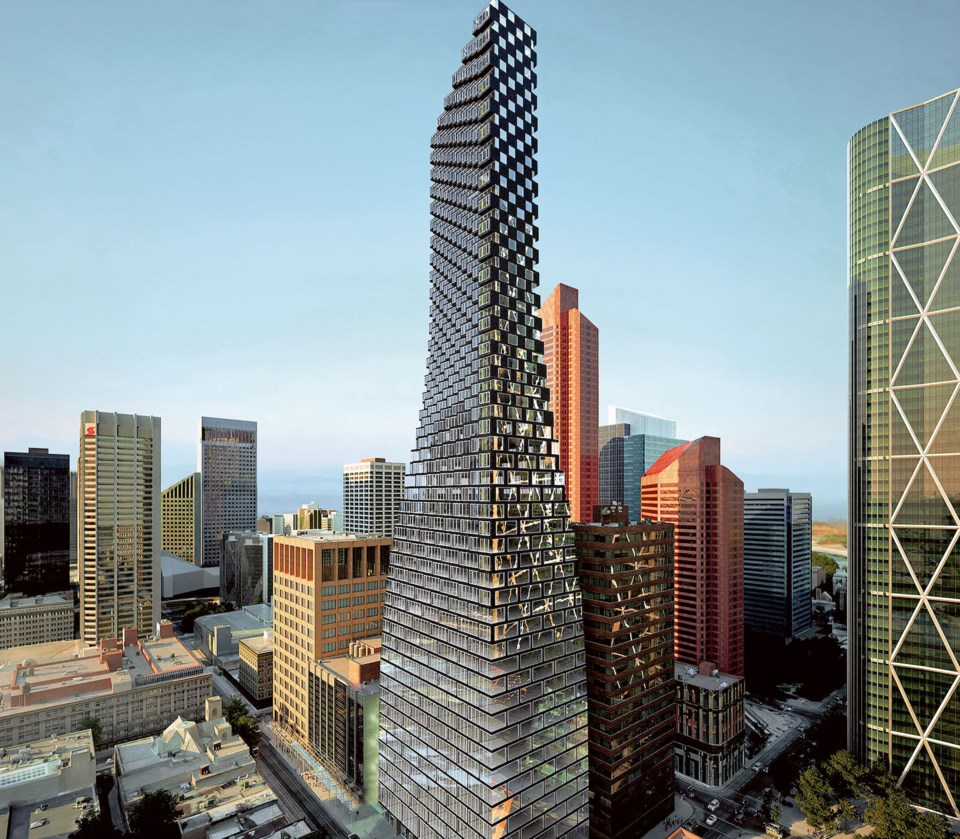Despite all the negative press about Calgary’s office market, Alberta’s biggest city has more downtown office space fully leased than in Vancouver’s core and more downtown offices leased than in all other major Western Canadian cities, combined
The evidence is shown in the latest office market reports for Canada, which shows that Calgary is in third place, behind Toronto and Montreal in downtown office leasing this year.
Across Canada, the national office vacancy rate rose to 15.7 per cent in the third quarter of 2021, the highest level since 2014, according to CBRE.
Calgary, with a near 30 per cent vacancy, has the highest downtown vacancies in the country, but the city also has 43 million square feet of downtown offices, the highest per-capita inventory of any city in the country, and much of it is Class A to Class AAA space.
As of the third quarter 2021, Calgary had 29 million square feet of office space leased in its downtown, compared to 21.5 million square feet leased in downtown Vancouver. Calgary’s core also more space leased than in the downtowns of Edmonton, Regina, Saskatoon and Winnipeg put together.
“Calgary simply has too much office space,” noted Frank Lonardelli, president of Calgary-based Arlington Street Investments and a major commercial developer in the city.
The five other largest cities in Canada have between two and three million square feet of office space per 100,000 people of population. Calgary has nearly five million square feet of office space per 100,000 people, according to an Avison Young mid-year report.
If only 30 million square feet office space had been built in downtown Calgary, the city would have one of the tightest vacancy rates in the country, Lonardelli noted.
There are 38 major office buildings in downtown Calgary that are fully leased, Avison Young reported, adding that developers continue to see opportunities in the city.
In September, Vancouver-based Regus, part of IWG, a provider of co-work spaces, leased 26,253 square feet on the 26th and 27th floor of Calgary’s 59-storey Telus Sky mixed-use tower, which completed two years ago with 350,000 square feet of office space.
The new Platform Innovation Centre in downtown Calgary’s East Village includes 50,000 square feet of office space, which is already pre-leased to Platform Calgary,
This August, Western Securities began construction on a mixed-use building with 146,000 square feet of office space on the site of the former Stadium Shopping Centre, a 6.5 acre site near Calgary’s Foothills Hospital and the University of Calgary.
The complex, known as Uxborough, will link to the hospital and the new Calgary Cancer Centre.
In its second-quarter Calgary office market report, Colliers noted a migration of tenants, primarily tech companies, from outlier locations into the downtown core, drawn by attractive lease rates, selection, amenities and inducements.
One notable move from the Beltline into the downtown was the recent shift by software developer Symend into 78,000 square feet at First Tower, a former Telus building that was totally modernized by Hines Group over the past two years. Symend has grown substantially from less than 20 to more than 200 employees over the past 18 months.
Another example is Absorb Software’s move into the new Telus Sky tower in downtown Calgary.
“The opportunity for companies in Calgary’s growing tech market to secure top tier core office space with room to expand continues to be a viable option downtown as energy companies continue to contract their space, notably in the class AA and A market segments,” Colliers stated.
As well, the City of Calgary is investing $45 million in total, to a maximum of $10 million per project, to encourage conversion of office space to residential and mixed-use space.
“While these initiatives will not solve Calgary’s high-vacancy situation on their own, combined they have the potential to make a significant impact over time,” Avison Young added.



